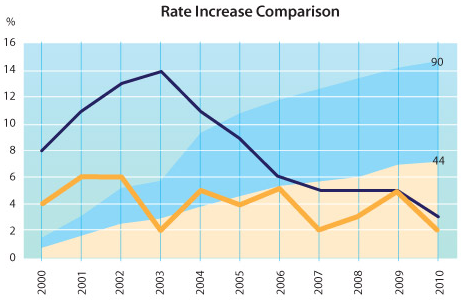 Last week I visited with Gary Rost, an unassumingly knowledgeable man and the Executive Director of the Savannah Business Group (SBG), arguably one of the most effective health care coalitions in the country. Their offices are only a couple hours away from my home on the Northeast Florida coast, so it was a quick trip up.
Last week I visited with Gary Rost, an unassumingly knowledgeable man and the Executive Director of the Savannah Business Group (SBG), arguably one of the most effective health care coalitions in the country. Their offices are only a couple hours away from my home on the Northeast Florida coast, so it was a quick trip up.
 Last week I visited with Gary Rost, an unassumingly knowledgeable man and the Executive Director of the Savannah Business Group (SBG), arguably one of the most effective health care coalitions in the country. Their offices are only a couple hours away from my home on the Northeast Florida coast, so it was a quick trip up.
Last week I visited with Gary Rost, an unassumingly knowledgeable man and the Executive Director of the Savannah Business Group (SBG), arguably one of the most effective health care coalitions in the country. Their offices are only a couple hours away from my home on the Northeast Florida coast, so it was a quick trip up.
SBG was founded in 1982 as a way of mobilizing employer buying power for better care at lower cost. Its reach now extends beyond Savannah about an hour south, north into South Carolina and west from the coast. The vision described on its site is straightforward and easy for purchasers to appreciate:
“SBG endorses and adheres to the principles of value-based purchasing: performance measurement, transparency, public reporting, pay for performance, informed consumer choice and collective employer leadership.”
Gary arrived a decade after SBG’s founding and has led the organization for 20 years. He aggregates and analyzes the med/surg and Rx claims data of his 23 regional member companies and governmental agencies, representing more than 16,000 employees and 35,000 covered lives. More important, he has used those data to inform activities that favor performance and value, and that try to steer away from poor care. He has formed a narrow high-performance provider network that is available only to SBG members, and has required the two major health systems to compete for a sole-source arrangement with his members’ plans. He has developed favorable drug, lab and vision arrangements. He has a variety of projects underway that focus on improving quality and value in the greater Savannah marketplace.
To its credit, SBG’s vision is long term and bigger than its own members’ immediate interest. Mr. Rost is proud of his members’ wellness/prevention efforts and says that, in his experience, those that deploy these approaches have lower overall costs than those who don’t. His group has had a hand in developing model disease management programs for SBG’s members. And SBG takes it as an article of faith that their efforts on behalf of members should also improve the health status and lower the health cost burden of the larger Savannah community.
 Their results have been compelling. In the decade leading up to 2010, the average cost per employee of SBG’s members grew at less than half the 90 percent national rate of premium inflation, by only 44 percent (a 4.1 percent annual premium growth rate).
Their results have been compelling. In the decade leading up to 2010, the average cost per employee of SBG’s members grew at less than half the 90 percent national rate of premium inflation, by only 44 percent (a 4.1 percent annual premium growth rate).
SBG’s members’ health plans outperformed those of Savannah’s non-SBG firms as well. For example, in 2010 the City of Savannah, an SBG member, spent just under $23 million for group health coverage on 3,250 employees and their families, an average cost per employee per year (PEPY) of $7,007. Chatham County, not an SBG member, came in at $12,619 PEPY, or 80 percent higher. To put that difference into perspective, assume that, all else being equal, the County handed over an additional $5.6 million per 1,000 employees to Savannah’s provider community.
Hard savings numbers like this are rare from business health coalitions, and beg the question, “What did SBG do differently?” One answer is that they have gone beyond merely collecting, analyzing and posting data. They have not merely hoped that their actions will encourage their members’ purchasing behaviors. Instead, SBG has become an active change agent for its members.
This approach has also undoubtedly transformed, to some degree, the way medicine is practiced in Savannah, though the performance numbers of non-SBG firms’ suggest that this is still only marginal. High performing physicians, hospitals and other services are identified and rewarded with preferred status. Low performing ones are, to the degree possible, bypassed. In other words, SBG’s members have used a variety of market forces to convey that they will actively seek higher value care. They insist that a community’s prosperity is tied to health value that does not place an unreasonable burden on purchasers.
The challenge now is to replicate what Gary and SBG have learned and make their knowledge and tactics readily available to employers and coalitions around the country. SBG has a history of sharing and would undoubtedly be amenable. The question now is whether, faced with untenable health care cost burdens, employers around the country will finally band together to begin to heal health care.
Market-based employer collaboratives like SBG can create successful results anywhere. Of course, bringing health care back into balance will also require that employers collaborate on policy, establishing a way to monitor and be a counterweight to the health care industry’s domination of Congress and the legislatures.
Following SBG’s lead – bringing employers together to act decisively in their own interests in the market and on policy – is a good place to start.






